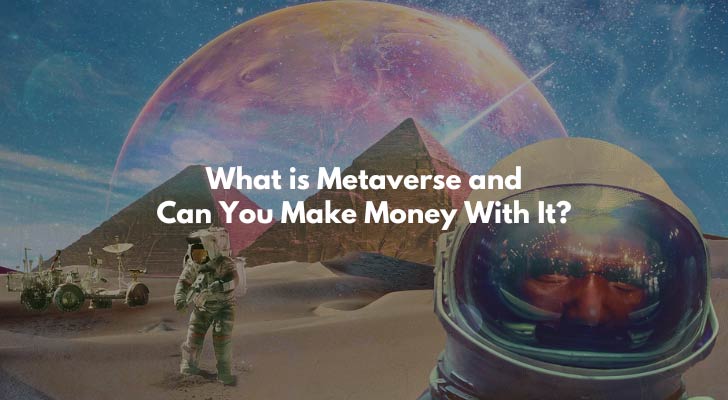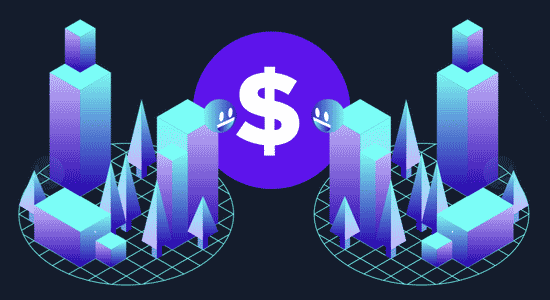In a virtual world where reality meets imagination, you can become whatever you want and do anything your mind desires. It's a place where people come together to connect, explore, and interact in ways that were once impossible. But what exactly is the Metaverse? How does it work?

What Really Is The Metaverse?
The Metaverse is a virtual world that is similar to the real world but exists entirely online. It is a shared space where people can interact with each other and with digital objects in a way that is immersive and lifelike. It is a fully realized digital universe, where users can create and customize their own avatars, interact with other users in real time, and engage in a wide range of activities, like gaming, shopping, learning and socializing.
There are already many virtual environments available in the Metaverse that allow you to travel to different locations and experience different types of environments, from realistic representations of real-world locations to entirely imaginary fantasy worlds. For example, you could explore a virtual ocean and interact with virtual marine life, or travel through a virtual space environment and experience simulated zero-gravity.
The Metaverse is not owned by any one person, syndicate, or organization. Rather, it is a decentralized network that is built on top of existing technologies like the Internet and blockchain. This means that anyone can participate in the Metaverse, and there is no central authority controlling the experience.
Virtual Reality (VR) and Augmented Reality (AR)
Virtual Reality refers to a technology that creates a completely artificial digital environment that users can immerse themselves in. With VR, users wear headsets or use other devices that block out the physical world and replace it with a simulated virtual world. Users can interact with and explore this virtual world through the use of controllers or motion-tracking technology. VR aims to transport users to a fully virtual environment, providing a sense of presence and immersion.
In the Metaverse, VR can be used to create completely digital environments that users can explore, interact with, and even inhabit.
Augmented Reality on the other hand, overlays digital content in the real world. AR enhances the user's perception of reality by adding computer-generated elements, such as graphics, text, or 3D models, into their field of view. This can be done through smartphones, tablets, or specialized AR glasses. AR allows users to interact with the real world while also experiencing additional digital information or virtual objects integrated into their surroundings. It enhances the existing environment by augmenting it with virtual elements.
In the Metaverse, AR can be used to provide additional information or enhance the user's experience of the real world. For example, AR could be used to add virtual art installations to a physical museum or to provide additional information about historical landmarks or cultural sites.
The Different Types of Metaverses
There are different types of metaverse based on their design, purpose, and user base. Here are some examples:
- Gaming Metaverses: These Metaverses are primarily focused on gaming and entertainment, and allow users to explore, interact with, and play games within a shared virtual environment. Examples include Roblox, Minecraft, and Fortnite.
- Social Metaverses: These are designed to facilitate social interaction and communication between users, allowing them to connect and collaborate in virtual spaces. Examples include Second Life, VRChat, and Rec Room.
- Enterprise Metaverses: Designed for business and professional use, allowing companies and organizations to conduct meetings, training sessions, and other activities in virtual environments. Examples include AltSpaceVR and Engage.
- Hybrid Metaverses: They combine elements of gaming, social interaction, and enterprise use to create a multifaceted experience. Examples include Decentraland, The Sandbox, and Somnium Space.
- Blockchain Metaverses: They use blockchain technology to create a decentralized and secure environment for virtual transactions and ownership of virtual assets. Examples include Decentraland, Somnium Space, and The Sandbox.
Do I Need a Headset?

No, you do not necessarily need a VR headset to start exploring the Metaverse. Many platforms can be accessed and enjoyed without it. You can use a computer, smartphone, or tablet instead to interact with the Metaverse through a web browser or dedicated software.
But you should really get one if you want to fully immerse yourself in virtual environments and have a more immersive experience, a VR headset can greatly enhance your Metaverse experience. VR headsets allow you to see and interact with virtual worlds in a more immersive and three-dimensional way. They can provide a sense of presence and enable you to interact with virtual objects and other users using motion tracking and specialized controllers.
How Much Will It Cost Me?
The cost to start in the Metaverse can vary depending on several factors such as the platform you choose, the hardware you need to run it, and your goals for using the platform. Here are some general cost estimates:
- Hardware: A VR headset can cost anywhere from a few hundred to several thousand dollars, depending on the quality of the headset and the computer you need to run it. A basic PC that can run a VR headset can cost around $1,000 to $1,500.
- Platform Fees: Some Metaverse platforms charge fees for things like virtual land ownership, content creation, and selling virtual goods. These fees can range from a few dollars to hundreds or even thousands of dollars, depending on the platform and the specific activities you want to engage in.
- Virtual Goods: If you want to buy or sell virtual goods, such as clothing, avatars, or virtual real estate, you'll need to have some virtual currency. This can range from a few dollars to thousands of dollars, depending on the platform and the value of the goods.
Can You Make Money In The Metaverse?
Yes, it is possible to make money with the Metaverse. While it may be challenging to earn a full-time income from the Metaverse alone, there are many opportunities for users to earn extra income or even turn their passion into a profitable business. Here are some examples:
Selling virtual goods
If you are skilled in creating 3D models, textures, or other digital content, you can sell your creations on marketplaces or in-game stores. You can also offer custom design services to other users.
Participating in gaming and esports
If you enjoy gaming and have skills in a particular game, you can participate in esports tournaments and win prize money. You can also stream your gameplay on platforms like Twitch and earn revenue through ads, sponsorships, and donations.
Hosting events
If you are passionate about a particular topic, you can host virtual events such as meetups, workshops, and conferences. You can charge admission fees or seek sponsorship to cover the costs of organizing the event.
Investing in virtual real estate
Some Metaverses allow users to buy and sell virtual land, buildings, and other properties. If you have the capital to invest, you can buy virtual properties and rent them out to other users.
Providing services
If you have a specific skill set, such as programming or 3D modeling, you can offer your services to other users. You can also become a virtual assistant, helping other users with tasks such as designing avatars, building virtual environments, or managing their virtual businesses.
Social media influencer
If you have a large following on social media, you can leverage your audience to earn money in the Metaverse. You can promote virtual events, products, or services to your followers and earn a commission on sales.
Virtual tourism guide
As the Metaverse expands, users may seek guidance on how to navigate and explore new virtual worlds. If you have expertise in a particular Metaverse, you can offer your services as a virtual tour guide and charge a fee.
Virtual fashion designer
If you have a passion for fashion and are skilled in designing clothing, accessories, and other virtual items, you can create your own fashion brand in the Metaverse and sell your designs to other users.
Virtual performer
If you are a musician, comedian, or other type of performer, you can use the Metaverse as a platform to reach new audiences. You can host virtual concerts or performances and earn money through ticket sales or sponsorships.

But How Do You Take Money?
Good question. There are several ways to collect money in the Metaverse, depending on the platform and the specific activity you are engaged in. Here are some common methods:
- Virtual currency: Many Metaverses have their own virtual currency that users can earn and spend within the platform. For example, in Second Life, users can earn Linden Dollars (L$) by selling virtual goods or providing services. They can then exchange L$ for real-world currency through third-party exchanges.
- Direct payment: Some Metaverses allow users to make direct payments to each other through in-game or in-app payment systems. For example, in Roblox, users can buy Robux, which they can use to purchase virtual items or donate to other users.
- Cryptocurrency: Some Metaverses use cryptocurrency as a means of exchange. For example, Decentraland uses its own cryptocurrency, MANA, which users can earn by contributing to the platform or by buying it from cryptocurrency exchanges.
- Third-party payment systems: Some Metaverses allow users to use third-party payment systems, such as PayPal or credit cards, to make purchases within the platform. For example, in VRChat, users can purchase virtual items using their Steam Wallet, which can be topped up with real-world currency.
- Smart contracts: Smart contracts mean sellers and buyers can engage through the lines of code. They can be used to automate the payment process and ensure that both parties receive their agreed-upon payment.
This hidden knowledge used by the elites will let you generate wealth and prosperity

How Much Money Do They Make on Metaverse?
Some users generate substantial income in the Metaverse through successful virtual businesses, while others may earn more modest amounts by participating in virtual economies or providing services. The amount of money one can make in the Metaverse can range from very minimal to substantial amounts, depending on the platform, the user's skills, and the demand for virtual assets. The average income potential can range from a few dollars to thousands of dollars per month.
To give you a general idea, let's consider an example:
Let's say you are a skilled 3D artist and you create and sell virtual clothing on a popular Metaverse platform. You spend several hours creating unique and high-quality virtual clothing items, and you price them at an average of $10 each. Over a month, you manage to sell 100 virtual clothing items. In this scenario, you would earn $1,000.
A user who creates and sells virtual assets such as clothing, furniture, or digital art may earn an average of a few hundred dollars per month. Still, this can vary significantly based on the user's skill level, pricing strategy, and the demand for their virtual assets.
What's The Easiest Way To Make The First Dollar?

The easiest way for anyone to make their first dollar with Metaverse is to participate in the virtual economies that offer rewards for completing tasks or missions. Many Metaverse platforms have their own virtual economies where users can earn virtual currency by completing simple tasks like watching a video, playing a game, or exploring a virtual world.
For example, in Decentraland, users can earn MANA, the platform's native cryptocurrency, by completing quests or participating in events. The MANA can be used to buy virtual land, items, and other assets on the platform.
Another example is The Sandbox, where users can earn SAND, the platform's native cryptocurrency, by playing games and completing quests. The SAND can be used to buy virtual land and assets on the platform.
Participating in virtual economies is an easy and low-risk way to get started with Metaverse and earn your first dollar. Once you have earned some virtual currency, you can use it to buy more virtual assets or even exchange it for real-world currency on crypto exchanges that support the Metaverse platform's native token.
What are the Best Metaverses?
Here are some of the most popular Metaverses:
Decentraland
Decentraland is a decentralized virtual world that allows users to create, experience, and monetize content and applications. It has a vibrant community of creators and developers and a robust economy built around its native cryptocurrency, MANA.
The Sandbox
The Sandbox is a virtual gaming platform. It allows you to create games, share, and monetize your gaming experiences. This blockchain-based platform has a user-friendly interface and offers a wide range of tools for creators to build and customize their own virtual worlds.
Somnium Space
Somnium Space is a social VR platform that offers a persistent virtual world where users can interact with each other and create their own content. It has a strong focus on virtual real estate and has a thriving marketplace where users can buy and sell virtual land.
VRChat
VRChat is a social VR platform that allows users to create, share, and experience virtual worlds with others. It has a large and active user community and offers a wide range of tools for users to create and customize their own avatars and environments.
Roblox
Roblox is a massively multiplayer online game that allows users to create, share, and play games with others. It has a user-friendly interface and a robust development platform that enables creators to build their own games and monetize their content.
The Pros and Cons of Metaverses
Here are some potential advantages and disadvantages of Metaverses:
Pros:
- Social Interaction: Metaverses provide users with the ability to interact with others in virtual spaces, allowing them to create communities and engage in social activities such as gaming, events, and virtual commerce.
- Accessible Entertainment: They provide users with a new form of entertainment that can be accessed from anywhere with an internet connection, making it accessible to people worldwide.
- Potential for Economic Opportunities: The Metaverse offers various economic opportunities to users such as buying, selling, and trading virtual goods and services, creating and selling digital assets, and creating virtual businesses.
- Creativity and Self-Expression: They enable users to express their creativity and identity through avatars, virtual worlds, and virtual objects, which can be customized to suit their preferences.
Cons:
- Addiction: Spending too much time can lead to addiction, negatively affecting the user's physical and mental health.
- Privacy Concerns: Metaverse companies collect user data, which can be sold to third parties or used for targeted advertising. This raises privacy concerns for users.
- Security Risks: They can be vulnerable to cyber attacks and hacking, which can lead to the theft of virtual assets or personal information.
- Expensive Equipment: Some Metaverses require expensive equipment such as VR headsets and powerful computers, making them inaccessible to some users.
- Digital Divide: They may widen the digital divide between users who can afford the equipment required to participate and those who cannot, creating a social and economic divide.
- Lack of Regulations: There is currently a lack of regulation and standards, which can lead to unethical practices and a lack of accountability.
It's clear that while there are many exciting possibilities surrounding metaverses, there are also valid concerns to keep in mind as we continue exploring this emerging technology.
Final Words
It is possible that the Metaverse could become a necessity in the future, depending on how it evolves and how it is used. The Metaverse has the potential to change the way we live, work, and interact with others, and it could become an essential part of many aspects of our lives.
For example, the Metaverse could be used for remote work and collaboration, virtual events and entertainment, socializing, and even education and healthcare. As more people adopt Metaverse technology and use it for these purposes, it could become a necessity for some individuals and industries.
Even if the Metaverse doesn't become a necessity in the future, the knowledge and skills you gain from exploring it can still be valuable in a digital and interconnected world. Many of these platforms have free versions or offer limited-time trials, so you can try them out without committing to a major investment.
How I "Finally" Make Over $7,000 Monthly Income
"The most valuable thing I've ever done!"
